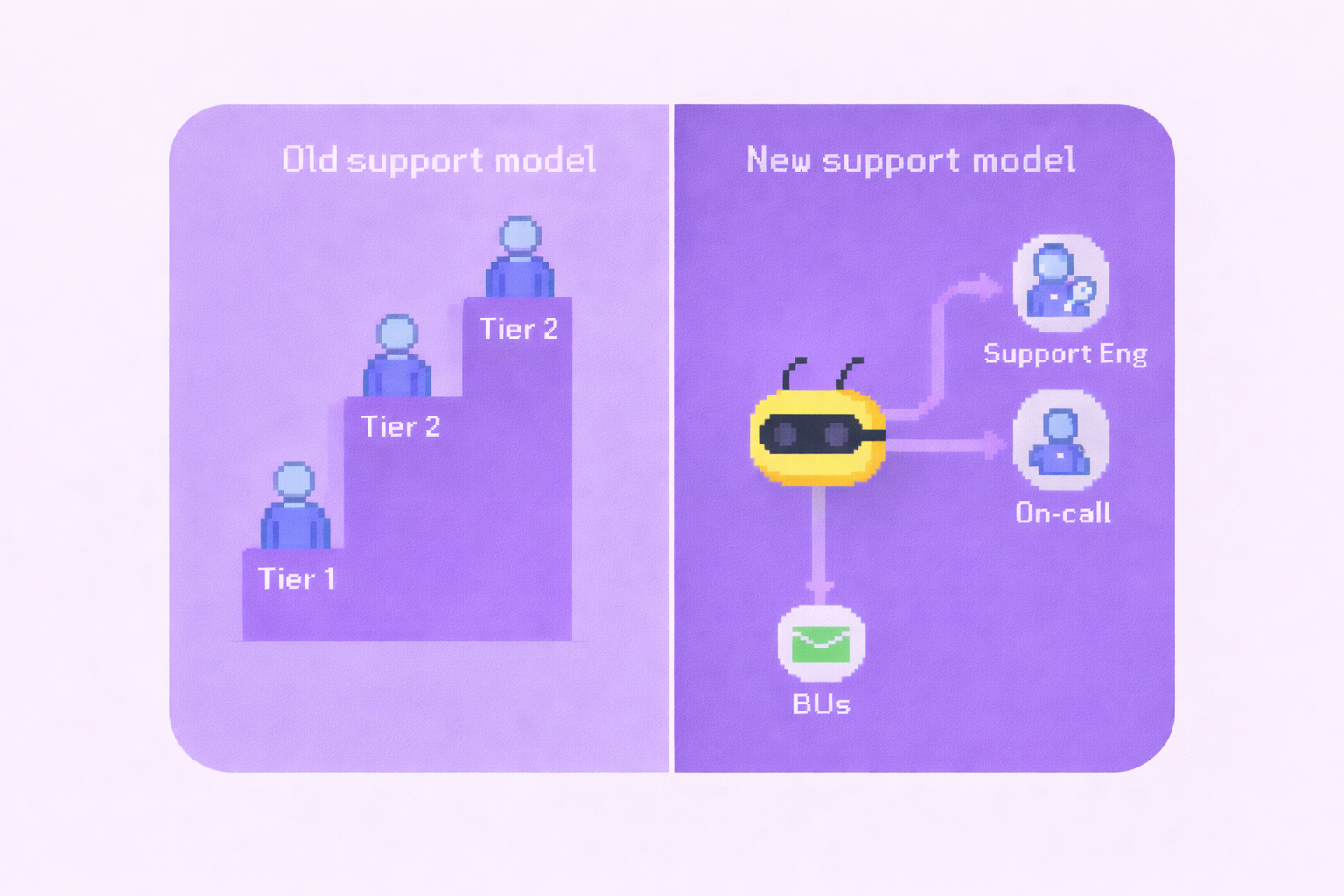Manager Mantras: How 11 Leaders Empower Their Teams

When we asked Structured Agency's VP of People about their biggest management breakthrough, Andrea Evans had a striking answer: "We went from high employee turnover to over a 90% retention rate."
While many factors contributed to that outcome, she pointed to one critical shift: moving from sporadic feedback to what she calls "feedback norms"—making constructive, relationship-based conversations a cornerstone of the agency's culture.
It’s a story we’ve heard echoed across organizations: managers who master a few core practices unlock pretty powerful results. Herein lies the challenge, though: today's managers are drowning in competing priorities and conflicting advice about what "good management" actually looks like.
That’s why we created Manager Mantras, a set of guiding principles designed to cut through the noise and help leaders focus on what truly moves the needle. When we asked our customers which mantras resonated most with their day-to-day challenges, three clear themes emerged:
1. Feedback and trust go hand in hand. Managers who prioritize authentic, relationship-based feedback see stronger connections and better results.
2. Culture is intentional. Thriving workplaces treat culture as a core part of their business strategy.
3. 1:1s are a cornerstone of continuous performance. The best managers go beyond status updates to focus on growth, coaching, and development.
Here's what 11 Bonusly customers and culture leaders had to say about the mantras that resonated most with them.

We asked: which mantra resonates most?

1. Andrea Evans, VP, People, Structured Agency
Mantra(s):
#4: Frameworks for feedback that foster & strengthen relationships.
#7: 1:1s should be development conversations.
#10: It’s okay not to have all the answers.
I’ve seen again and again through experience across multiple organizations that employees crave feedback, yet they fear giving it (and sometimes, ironically, dread receiving it—even when they know it’s good for their development). A barrier? Fear. Lack of strength in the relationship. Happily, the opposite is also true. Start with the relationship, and focus on building trust, and this invites the possibility for real feedback conversations.
At my agency Structured, we work hard to focus on building our feedback culture. One ritual is "feedback Fridays"—we end each week with some type of feedback share or exercise, like strength & conditioning. Feedback norms are proving to be transformative to our organization, and we have gone from high employee turnover to over 90% retention. I believe strong relationships & feedback practices are key!

2. Todd Wuestenberg, Chief Culture Officer, Haverkamp Properties
Mantra #5: Culture development needs more than good intentions.
A thriving culture isn’t something you hope happens; it’s something you build, nurture, and care for. Culture development must be purposeful.
I use a simple formula to explain the three key components of a thriving culture: TC = P + P + P (Thriving Culture = Purpose + Persistence + Planning). Culture is growing every day, either by design (thriving) or by default (surviving). As leaders, we must be proactive, not passive. That means a part of being intentional is equipping managers with the training, tools, and trust that turn good intentions into lasting impact.
At Haverkamp Group, we’ve embedded culture development into our leadership pipeline. Our Leadership in Training (LIT) program prepares emerging leaders (managers) to understand themselves better, embrace a growth mindset, and lead others with clarity and confidence. We also tie talent development and recognition to our core values, ensuring our culture shows up in how we work every day. We treat culture with the same level of strategic importance as operations or finance, because how we work together shapes our ability to reach our organizational goals.

3. Jessi Prizinsky, Director of Operations, JS Perkins Consulting
Mantra #2: Recognition shouldn’t start or stop with me.
This mantra resonates because it highlights the importance of creating a culture where appreciation flows freely across all levels—not just top-down. Recognition shouldn’t be a box to check during formal reviews or something that only leaders give. It should be a habit everyone practices—reinforcing team cohesion, celebrating effort, and motivating excellence.
In my work at JS Perkins, I try to model this by openly recognizing great work during meetings but also encouraging peers to shout each other out in real time. We’ve seen how this builds trust and engagement. When someone sees their colleague’s hard work acknowledged, they’re more likely to do the same. It’s become part of our team dynamic: recognition is contagious, and when it becomes shared, it becomes sustaining.

4. Elizabeth Sziler, People and Culture Manager, MAGNA-TILES
Mantra #9: People-first decisions need organizational support.
People-first decisions need organizational support resonates with me because I believe great leadership starts with empathy, trust, and a genuine investment in people. When leaders prioritize connection and compassion (aka, leading with heart), it creates a culture where individuals feel seen, heard, and valued.
I see this mantra in action every day at MAGNA-TILES, whether we’re celebrating milestones or just checking in to make sure someone’s okay. For me, it’s about creating space for honest conversations, being a source of support, and looking for ways to help people grow. It’s about showing up for the person and making sure they know they matter and feel seen.

5. Erin Darkuszka, Senior Human Resources Consultant, OneDigital
Mantra #10: It’s okay to not have all the answers.
Throughout my career, I’ve seen managers fall into the trap of believing they must always have the answers. As humans, it’s simply not possible to know everything—yet as leaders, we often feel pressure to appear all-knowing.
What truly matters is cultivating curiosity and the courage to admit when you don’t know something—and then taking action. It’s not enough to say, “I’m not sure;” you must commit to finding the answer and following up. I’ve seen the opposite play out in organizations, where managers pretend to know the answer rather than admit uncertainty. Employees can sense this, and it erodes trust.
As a coach and consultant at OneDigital, I encourage leaders to embrace vulnerability, acknowledge when they don’t have all the answers, and commit to learning and following through. I also emphasize the importance of clarity—knowing what you do and don’t know—and seeking the information needed to make confident decisions.

6. Jessica Begley, COO, Very
Mantra #9: People-first decisions need organizational support.
As a COO, I can make people-focused choices in the moment but without systems and policies that reinforce them, those choices don’t scale or sustain.
At Very, we’ve built frameworks that make support for our people part of the company’s DNA, from transparent career pathways to feedback and recognition systems woven into daily work. This ensures that putting people first isn’t just a philosophy, it’s an organizational reality.

7. Kristopher Alvarez, Senior Director of Operations, Luxury Cruise Connections
Mantra #5: Culture development needs more than good intentions.
This Manager Mantra stands out to me because I’ve seen firsthand that culture doesn’t sustain itself on passion or good will alone. Leaders can talk about values all day, but unless those values are built into our day to day systems, processes, and our leadership teams behaviors, culture becomes inconsistent and fragile.
At our agency Luxury Cruise Connections, we’ve put this into practice by treating culture with the same level of love as our company strategies and operations. For example: recognition isn’t optional—it’s embedded. We use Bonusly to make intentional recognition visible and consistent across teams, ensuring it becomes part of daily work.
What I’ve learned is that culture development requires the same discipline as any business function—it needs frameworks, accountability, and reinforcement at every level. That’s why this mantra resonates with me so strongly: it reflects the reality of leading a growing, high-performing organization.

8. Mike Battle, Onboarding & Engagement Manager, Teleport
Mantra #7: 1:1s should be development conversations.
Regular development-focused conversations are one of the most powerful ways to motivate employees and build stronger trust with their managers. As an employee, it shows me that my manager genuinely cares about my growth—not just the day-to-day tasks. There’s nothing more deflating than a stagnant 1:1 that only covers status updates.
At Teleport, we’ve seen this play out by embedding consistent development check-ins into our performance assessment process. Every quarter, employees have structured feedback and growth conversations with their managers. In addition, we run quarterly leadership surveys to the entire org to take a pulse on how managers are showing up in areas including recognition, feedback, goal setting, clarity, and development.
Above all, making 1:1s about development helps employees become the best version of themselves—with clear insight into what’s working well, where they can grow, and the added motivation of knowing their manager genuinely cares.

9. Matt Ley, Co-founder and Chief Strategist, Inflection Point Nexus Advisors
Mantra #7: 1:1s should be development conversations.
I believe one-on-ones are the most important role of a manager—it’s really the reason the role exists. In my book Manage Your Gaps: Reclaiming the Awesomeness of Management, I share the journey I took exploring different approaches to one-on-ones: focusing on others, on yourself, on information, and on development. What I found is that the only type of conversation that doesn’t happen naturally—unless you’re intentional—is the developmental one.
That’s why I built a structure around it: how often to hold them, what to cover, and especially two anchoring questions: 1) What’s something exceptional you’ve done since our last one-on-one? 2) What’s something you’re excited about between now and our next one-on-one?
These questions serve as touchpoints. If someone consistently struggles to answer them, it’s often a sign that realignment is needed before disengagement or burnout sets in. They also help people build confidence in naming their own strengths—keeping their gifts at the forefront not just in their current role, but throughout their career and life.

10. Deborah Pollard, People Operations Specialist, TEECOM
Mantra #6: Context makes all the difference.
The Manager Mantra that resonates most with us in People Operations at the moment is Context makes all the difference. Through feedback sessions, we have learned that certain important communications have not been making it down to all levels of the organization. These communication gaps contribute to team misalignment, disengagement, and confusion on the ‘why’ behind certain focuses or initiatives.
Managers can’t encourage adoption and engagement if they themselves don’t understand what they are communicating fully. At TEECOM, empowering management, at every level, with the information needed to effectively communicate down to all employees ensures effective and equitable company communication.

11. Nicole Alos, Founder, Leadership Advisor, Socratyc
Mantra #10: It’s okay not to have all the answers.
To me, the mantra “You don’t always have to have all the answers” is really about unlocking the incredible potential within your team. When you create space for people to find their own solutions, something amazing happens. They start to trust themselves more and discover capabilities they didn’t even know they had.
Through my work at Socratyc, I’ve watched teams transform when leaders step back and let them shine. Instead of looking to managers for answers, team members begin to look within and around them. They become more creative, more confident, and more invested in the outcomes because they’re the ones creating those solutions.
Also, I’ve found being receptive to new ideas from those who know the challenges firsthand creates a real competitive advantage. As Michael Bungay Stanier illustrates in The Advice Trap, when you resist being the hero with all the answers, you support a team full of individuals who believe in their own power to make things happen.
What makes these approaches work
What these leaders show is that the best management practices are habits that compound over time. Feedback gets easier (and more powerful) the more you give it, and 1:1s turn into real growth conversations when they go beyond status updates.
Meanwhile, your culture strengthens, because you are treating it as something worth investing in.
None of this happens by accident. These managers have put systems and rituals in place that make great management the new normal. And they remind us that being a good manager doesn’t mean you have to be an expert in having all the answers. What’s most inspiring is how they create the conditions for others to thrive, and show up consistently to make that possible.
So, which mantra sticks with you? Start small: a new question in your next 1:1, a small ritual that reinforces culture, or a shift in how you give feedback. As Todd Wuestenberg put it, culture grows every day, by design or by default. The same is true for management. The most important step is deciding to be intentional, starting today.
.jpg)







